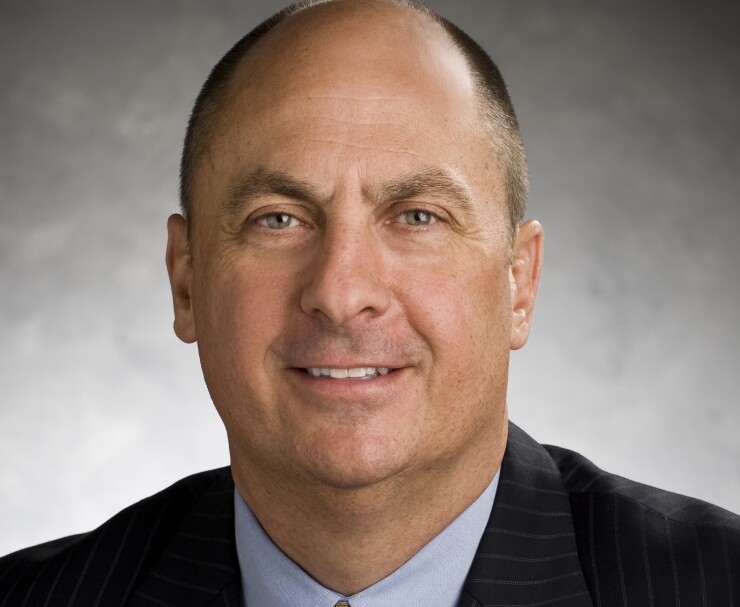The largest not-for-profit hospital systems in Illinois, Michigan, and Wisconsin announced Wednesday they are in talks to join forces to create a new parent organization with more than $17 billion in annual revenue.
Downers Grove, Illinois-based Advocate Aurora Health — created by the 2018 merger between the Wisconsin-based Aurora and Illinois-based Advocate — and Royal Oak, Michigan-based Beaumont Health announced the signing of a non-binding letter of intent to “deepen discussions” about a merger.

“It’s about exploring and creating a regional organization to accelerate our ability to advance healthcare across the upper Midwest,” Beaumont’s chief executive officer John Fox said during a news conference.
“The potential opportunity to leverage the strength and scale of a regional organization while maintaining a local focus and strong presence in Michigan as a leader and major employer is important to us,” Fox said.
Beaumont had been planning a merger with Ohio-based Summa Health, which was
In the Advocate Aurora tie-up, Beaumont would not close any facilities and believes the scale of the new organization would pave the way for local investments the system otherwise could not undertake on its own. “Our goal is to grow market share,” Fox said.
“This is a unique opportunity to explore a partnership with a like-minded, purpose-driven organization,” Advocate Aurora CEO Jim Skogsbergh said in a statement.
The Advocate/Aurora combination created the 10th largest not-for-profit health system nationally. Advocate grew to become the largest system in Illinois through acquisitions and its leaders have said they continue to eye expansion to capitalize on the negotiating advantages and other benefits offered by a larger-scale organization.

AAH operates 26 hospitals with about $12.8 billion in annual revenue. Beaumont operates eight hospitals with about $4.7 billion in revenue.
Fox said the systems hope to complete a deal this year. He cautioned that an agreement is far from final and either could pull out at any time. If they decide to proceed, regulatory approval from Illinois, Michigan, Wisconsin, and federal authorities would be needed.
The previously undisclosed discussions began late last year and continued into early 2020. They were paused by the COVID-19 pandemic as each focused on its response and managing the balance sheet impact.
As part of the letter of intent to explore the merger they agreed to an equal one-third governance structure with Aurora, Advocate, and Beaumont each accounting for five members of a 15-member board. The boards of the two systems signed off on the letter of intent last week.
The brands of each system would remain in place as has been the case with Advocate and Aurora but a new parent organization would be formed with a new name that has not yet been decided.
The systems “are going to look” at the obligated group structure, Fox said. “We think together we will be a stronger credit and the way you can take advantage of that is by having an obligated group” to lower borrowing costs.
The joint release noted “the parties will evaluate optimal credit structure alternatives and whether the refinancing of all or a portion of the existing debt could be considered beneficial to the combined organizations. Any refinancing would be dependent on market conditions, management considerations and other factors.”
Beaumont carries ratings in the single A category and AAH is rated in the double-A category. Aurora’s debt was upgraded after the 2018 merger with Advocate. Aurora’s debt was then folded into Advocate’s master trust indenture which was amended
The merger talks began last year as Beaumont was also engaged in discussions to acquire Summa Health. Those talks began in mid-2019 and led to
While no reason was given for abandoning the tie-up, Summa attributed the decision to Beaumont. Fox said Wednesday the two were unrelated and that AAH had told Beaumont it was “fine” whether its acquisition of Summa moved forward or not.
The failed negotiations “had nothing to do with AAH” and stemmed from changes that were needed in the agreement due to “financial realities” largely stemming from the pandemic, Fox said. He did not elaborate. “We elected not to proceed,” he said.
They deal had received all necessary state and federal regulatory approvals.
Ahead of an Advocate Aurora spring bond sale, Fitch Ratings and S&P Global Ratings affirmed Advocate’s AA rating and stable outlook. Moody’s affirmed its Aa3 rating. The system has $2.8 billion of debt.
Both systems are resuming elective procedures that were put on hold as hospitals prepared for an influx of COVID-19 cases. The sector is still assessing the impact on balance sheets from pandemic-driven costs associated with personnel and equipment and the loss of elective surgeries while also preparing for possible future waves of the disease.
AAH reported ahead of the bond sale that it expected a $168 million drop, or 15%, in expected revenues for March with a preliminary operating loss of $71 million expected for the quarter ending March 31. The system is managing part of the strain with a hiring freeze for some positions; it put off equipment purchases and will delay $400 million in capital spending through the year.
The Beaumont Health obligated group has roughly $1.5 billion of outstanding debt. Beaumont has cut executive pay and turned to furloughs and layoffs to manage the pandemic’s fiscal impact. It previously reported $54 million in first quarter operating losses.





